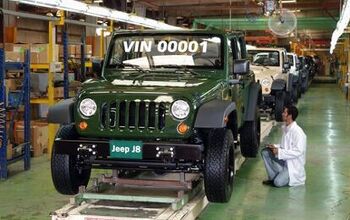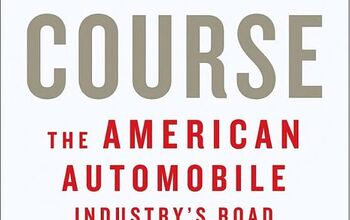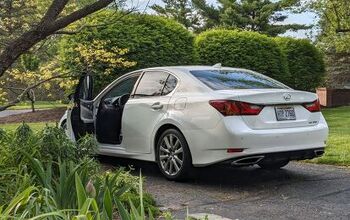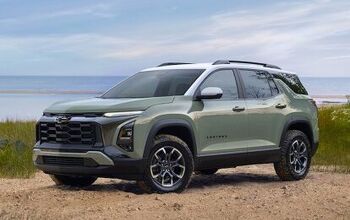Is the American Automobile Industry Worth Saving?
Do we need an American automobile industry? And by American, I mean those manufacturers, suppliers, and associated vendors owned and operated by US citizens – red blooded, football-loving, meat and potato types. (Ok, that’s a stereotype, but you know who I’m talking about.) I submit that it’s in our national interest to keep it alive and moving forward. Farago disagrees completely (editorial to follow).
For now, we’re going to ignore the mechanics of rescuing Detroit. Or discussions about saving two of the companies and letting the third one go (back) to the dog(s). And we won’t even raise the question of how silly it might be to let Nancy Pelosi-– from San Francisco– to lead the charge to shovel your money to Detroit. So don’t go there; TTAC’s got that discussion covered already. Nope, this is a purely philosophical discussion about the merits of a home grown auto industry. So here goes…
Transportation provides the arterial network of moving people and goods around this country. It’s a darn big country, and most of it has been developed and organized around personal vehicles. Not trains, planes, or buses. The Unites States has more vehicles per capita than any other country in the world: 765 units per 1,000 population (from the United Nations Statistical Yearbook). England, by comparison, has only 426 per 1,000 pops. More new vehicles are sold in the United States than in any other country by millions. (China is the closest at 10 million units – but they’ve got four times the population of the USA.)
By any yardstick, the Unites States is the biggest and most prolific user of automobiles of any country in the world today.
It’s also the richest vehicle market in the world. American’s buy more “vehicles” (in terms of size, content, power, and fuel consumption) than anywhere else, too. While Europeans pay more for cars, they generally get less too: smaller cars, smaller engines, and in many countries, devoid of air conditioning or automatic transmissions. The developing world gets vehicles lacking most safety innovations and creature comforts. We get the best vehicles, with the highest level of safety, amenities, and power. And big, powerful, personal trucks to do our hauling.
So not having a home-grown automotive industry to sell to this market just seems insanely stupid. Everyone else (mostly) seems to make money selling new cars. Toyota and Honda make more profits here than anywhere else. New car sales represent a $400b per year market here. Selling a fraction of this market means big revenues and a Gulfstream jet or three for the executives. Just think of the waterfall of those dollars trickling through the economy with every car sold. Do we really want to ship a big chunk of those dollars overseas to foreign companies, governments and their owners so they can live the high-life?
Sure, we do buy a lot of goods from overseas. But it’s mostly stuff we can’t manufacture here at the same cost as over there. When a seamstresses cost $8/day in China, with few benefits paid and no OSHA regulations, we benefit from the savings as consumers. It makes little sense to produce Walmart’s clothes here.
But guess what? The costs to manufacture a new vehicle in the United States are about as cheap as it gets for the level of car sold as anywhere in the world. The direct labor component of a car represents roughly $1,800 of its total cost. Believe it or not, the direct production cost differences among all US-based assembly facilities from any manufacturer are nominal.
What’s different: the profits of foreign-brand cars assembled or imported in the United States go back to their home countries. That means their countries benefit from reinvestment of those profit dollars into the next generation of vehicles. Better motors, advanced electronics and safety equipment, and even new propulsion systems come from over there– not from US ingenuity and skills. Do we really want to depend on Japan, Korea, and Germany (and soon China) for the future of our cars and related technology or do we want it grown here in the USA?
What’s most promising is that the future of personal vehicles lies not with traditional gasoline ICE, but with variants thereof such as HCCI, diesel, and hybrids and/or all-electric vehicles. Getting there requires a huge investment of dollars. New tech also delivers collateral benefits: software for engine management, ride control, transmissions, heat recovery systems, emissions, and improvements in safety systems. Investments in new technologies come directly from the profits generated from selling vehicles today. And they’re mostly made by suppliers looking for an edge. We simply can’t abandon our future to others.
We need an American auto industry. One that runs the table on the entire production and sales chain. There’s no cost basis reason not to produce vehicles here. We just need better run companies with forward thinking managements. You can argue how we get there, but not where we need to be.
More by Ken Elias
Latest Car Reviews
Read moreLatest Product Reviews
Read moreRecent Comments
- Jor65756038 As owner of an Opel Ampera/Chevrolet Volt and a 1979 Chevy Malibu, I will certainly not buy trash like the Bolt or any SUV or crossover. If GM doesn´t offer a sedan, then I will buy german, sweedish, italian, asian, Tesla or whoever offers me a sedan. Not everybody like SUV´s or crossovers or is willing to buy one no matter what.
- Bd2 While Hyundai has enough models that offer a hybrid variant, problem has been inadequate supply, so this should help address that.In particular, US production of PHEVs will make them eligible for the tax credit.
- Zipper69 "At least Lincoln finally learned to do a better job of not appearing to have raided the Ford parts bin"But they differentiate by being bland and unadventurous and lacking a clear brand image.
- Zipper69 "The worry is that vehicles could collect and share Americans' data with the Chinese government"Presumably, via your cellphone connection? Does the average Joe in the gig economy really have "data" that will change the balance of power?
- Zipper69 Honda seem to have a comprehensive range of sedans that sell well.


































Comments
Join the conversation
+1 for PCH101. In addition to all of our miliary equipment already being built, and much more advanced than Corvettes and F-150's...I don't believe that another major war would be fought on any ground. Jet's will carpet bomb their targets, and if that doesn't work, we have thousands of nukes to get the job done. If there is a next world war...everybody will lose...everything. Tanks and humvees aren't going to help anything.
Problem with nukes is that any dangerous potential enemy (China, Japan, Europe, Brazil, Russia, India) has them too. And most of the countries that are not dangerous but aren't kittens either have them too(Nigeria not, Iran not, Turkey yes, Korea (south) yes, South Africa yes, Pakistan yes, Argentina yes, Egypte yes) This just makes military power above a certain level useless